(20-minutes read time)
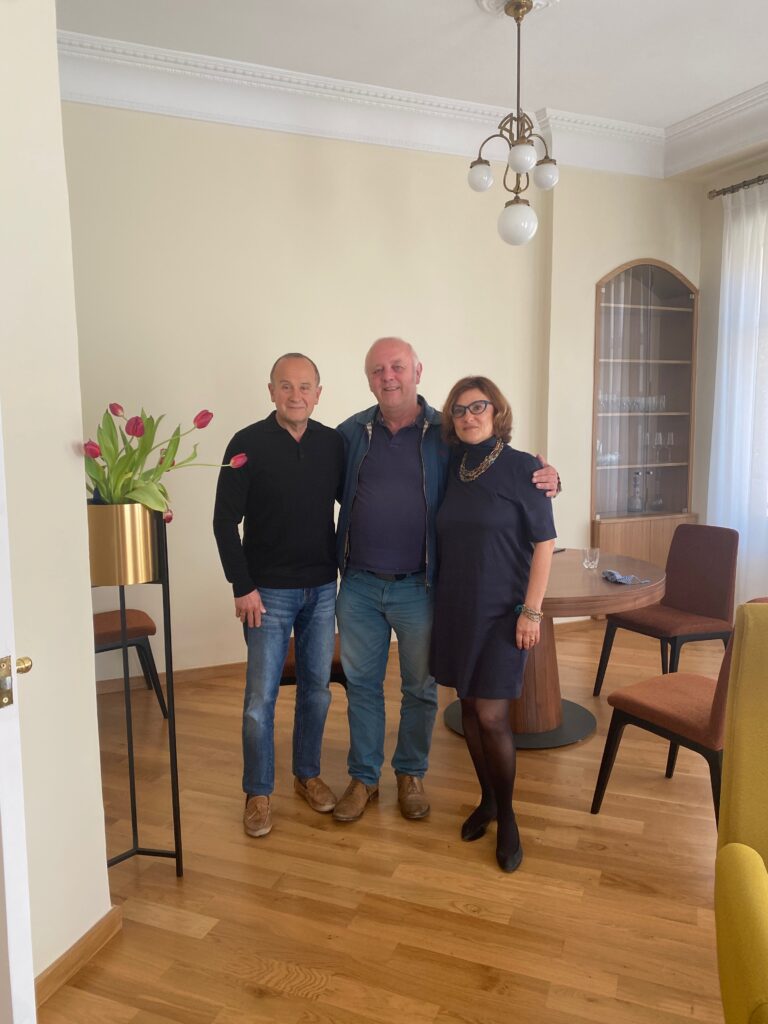
Paul, left, Eugene center, Viktoriya right
Paul Sidorov, 64, and wife Viktoriya Kozlova left their native Ukraine in the 1980s under an amnesty to allow Jews to go to Israel but instead went to New York, settled upon California and now have moved to Cánovas, where they commissioned artist Francisco Bravo Cabrera to tell their story in a quadriptych of astonishing original works. Eugene Costello went to hear their story…
Cánovas is one of the more upmarket neighbourhoods in Valencia, with a great offering of bars and restaurants and well-heeled residents. A large green finca stands at the intersection of Ciscar and Borriana; I am here to meet Paul and Viktoriya who, I am assured, have a wonderful story for me.
I take the lift to the third floor, where Paul and Viktoriya are waiting to greet me, smiling effusively. Paul is 64 but could be a decade younger, slim with a boyish face and permanent, welcoming smile; Viktoriya is “some years” younger – in her fifties is all she will say – and is elegant, chatty and prone to laughing. A lot.
First, they give me a tour of the apartment; it is a paean to good taste, after an extensive reforma, and all the furnishing and fittings show impeccable discernment, expensive but not ostentatiously so, in the mid-century style, and it puts me in mind of Manhattan’s Upper East Side.
After Paul makes me a coffee, Viktoriya prepares a jug of iced water with mint and fruits of the forest, and we seat ourselves at the dining table in their large salon.
Paul speaks first, and tells me that they were born and raised in Kiev, Ukraine. Viktoriya was still a teenager when they married in 1981 and Paul was 24. In 1989, they joined the diaspora of Jews streaming out of the former Soviet Union, with around 65,000 giving up citizenship to start a new life in Israel, with their daughter, Jenny, then five.
But as Paul says: “Once you leave Ukraine, you are in the free world. We took a train to Vienna and, instead of continuing our journey to Israel, we left the station when we arrived, to join other Jews doing similar things to reach the United States, Canada or Australia.”
Viktoriya adds: “Yes, once we said we wanted to leave, they revoked our citizenship, gave us about €100 per person and we were suddenly on a train crossing Bratislava to reach Vienna.”
Paul explains: “There were no diplomatic relations between the Soviet Union and Israel so we had to go via Austria, and that was where we decided to try to get to the US.”
First, they had an interview in Vienna, then they had to move to Italy to await an interview with the American Consul to see whether they qualified for refugee status. Viktoriya says: “We were lucky that we had my uncle in the United States, and his wife, so we had someone to vouch for us.”
Paul adds: “We had to wait for about five months while they checked our application, so we rented an apartment on the outskirts of Rome, overlooking the Mediterranean Sea. There are worse places to stay!”
TAKING A BITE OUT OF THE BIG APPLE
They finally made it to New York, and stayed briefly with the uncle before finding their own apartment in Bay Ridge, Brooklyn. It was an Italian neighbourhood – “a long way from Brighton Beach,” says Paul, “the heart of the Russian-Jewish emigrant community in New York.”
It was a one-bedroom apartment on the first floor, says Paul, with its own resident community of mice that he had to lay poison for, removing their corpses on a daily basis. They salvaged neighbours’ furniture and carpet from skips. Viktoriya says: “One day Paul came home looking white. He told me he had been about to ‘liberate’ a piece of carpet from a skip when three Russian men appeared with knives, saying, ‘That’s our carpet, we’ve been looking for something like that for three weeks’.”
It’s a tribute to their strength of character that the two of them look at each other and chuckle at the memory; there is enormous affection between them, and one can only conjecture that the almost unimaginable travails that go with starting again at the bottom and the tribulations of the immigrant life have only served to unify them. Victims, however, they most assuredly are not.
They managed to assemble decent furniture and even a TV set – it was a decent neighbourhood – and the building superintendent was Puerto Rican. Paul says: “One day, he appeared while Viktoriya was cooking and he liked the smell, so we fed him. Next thing, we are best friends and he takes us down to his basement where he had lots of things he had collected and let us choose what we needed.” Evidence of the melting pot that makes New York one of the most cosmopolitan cities of the world, clearly.
They arrived in New York on 12 January 1990, their daughter’s birthday, and Viktoriya’s uncle took them to celebrate in a neighbourhood Russian restaurant. Says Viktoriya: “The first person we saw in that restaurant was our former neighbour from Kiev. Imagine!”
Paul takes up the story: “We found the New York winters tough. They were like the winters back home, and we thought, ‘we left Kiev for this?’ I was working as a taxi driver in Brooklyn but we felt there must be something more for us.”
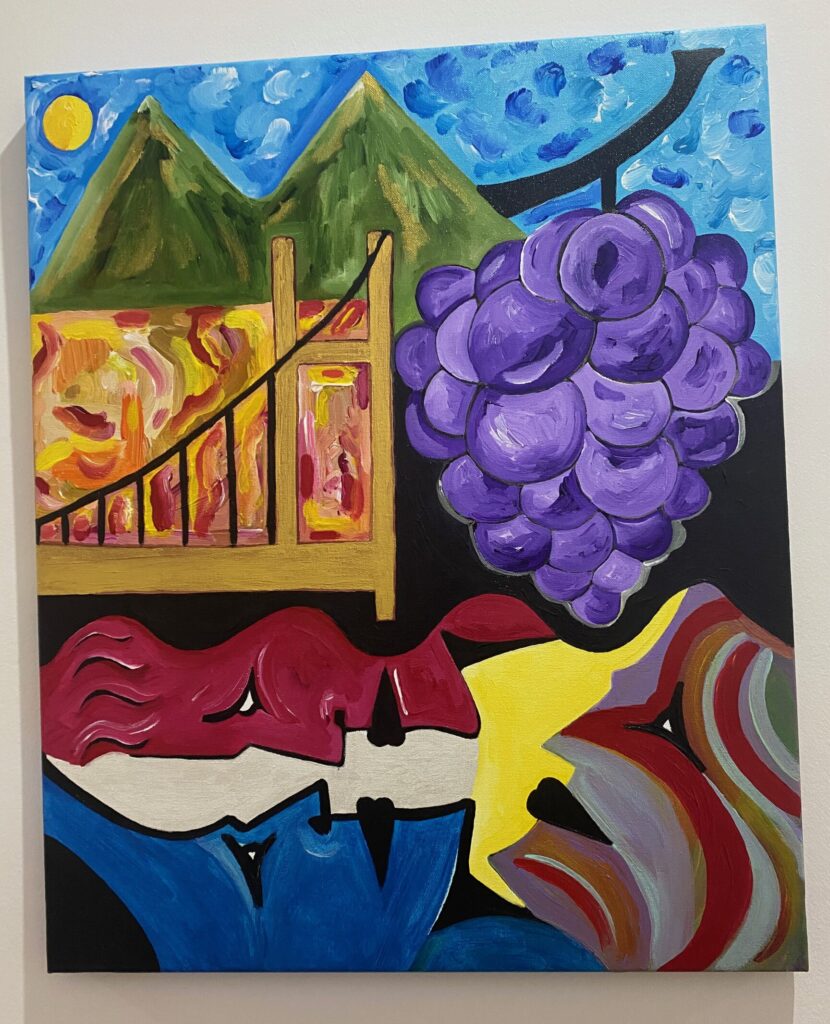
WESTWARD HO!
Viktoriya’s classmates had family who moved to San Francisco, and said, come, the weather is great, there is lots of work and they had nothing to hold them in New York. So they notified the government of their plans to move, these friends bought their flights and they headed for their new life.
After New York, San Francisco felt like a village – about the same sort of population as Valencia – but there were trees, the Pacific Ocean, huge skies, sunshine and easy access to beautiful countryside.
Finally, they felt a sense of homecoming – they had found their place. And things improved, immeasurably. Paul started off with simple jobs in the tech sector, repairing ATM machines, cameras and then got a job at the plant for Pennzoil, fixing electrical controllers and so on.
And then he moved into software engineering, after taking some night classes, and the timing was perfect, as Silicon Valley began to explode. Says Paul: “I was working day and night, I even had a bed in the office, but Viktoriya told me, ‘It’s now or never, Paul’, and she was right.”
His career grew exponentially, and the big break was to get a job at Washington Mutual writing code for credit card protection. Life in the sun was good.
Then disaster came knocking once again. Says Paul: “The crash came and to begin with, I was not worried, like Lehman Brothers, the view was, Washington Mutual was too big to fail.” With characteristic understatement, he pauses, then adds: “It wasn’t.”
And with a rueful smile, he says: “I lost everything. My savings, my secure future – wiped out overnight.”
Rudyard Kipling wrote in his famous poem If:
“If you can meet success and failure and treat them both as impostors, then you are a balanced man, my son.”
In the story of their lives, what might have broken a lesser man was grist to the mill for Paul, and his number one supporter, Viktoriya.
Meanwhile, Jenny was growing up to be a true American girl, but never fully immersed herself into American culture. Paris was her dream and she took an opportunity to enrol into the Study Abroad program in college. Dreaming big, like her parents, off she went to conquer France.
Meanwhile, Paul shook himself down, dusted himself off and started all over again. He found a job as a software engineer for Safeway, the huge supermarket chain, writing software for a new trend called home shopping and delivery, which history records has exploded. Again, right time, right place, and with a good package, once again Paul snatched victory from the jaws of defeat, and on the back of this moved to new businesses based on cloud computing, first PeopleSoft and then Workday, his last job, which left the couple financially secure and able to start to consider retirement plans.
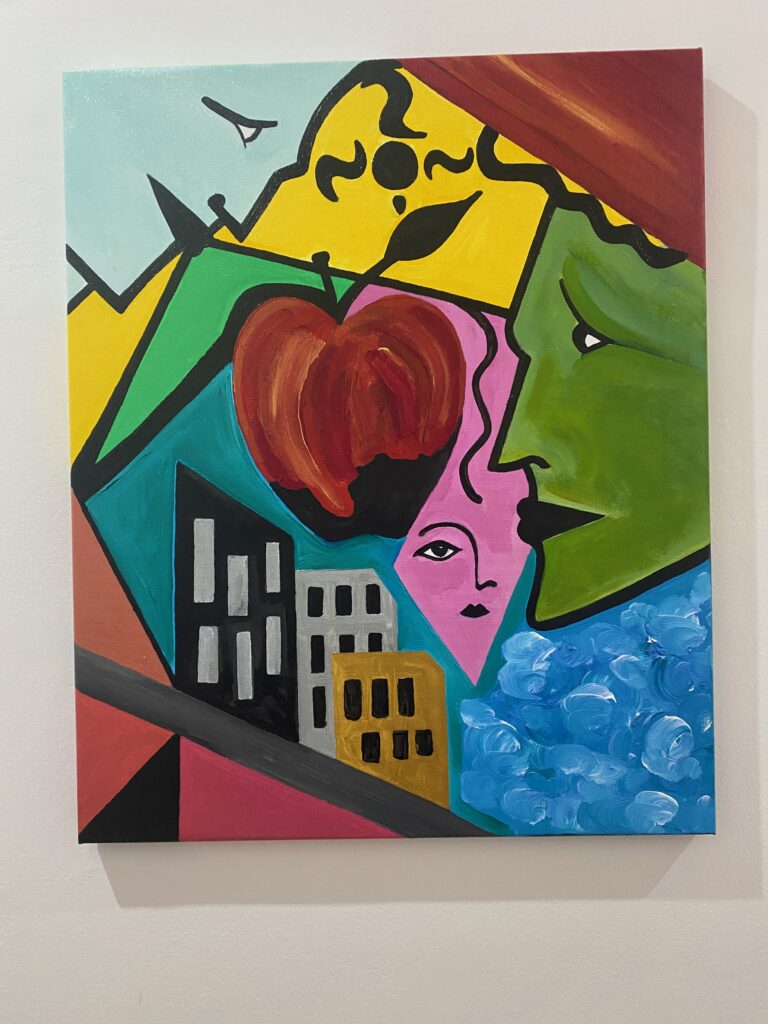
Viktoriya also had a great career, working first for IBM, then Kaiser, and latterly a bank implementing a new platform. So, having started with nothing, and returning to nothing due to the vagaries that life throws up, they are winners in life, and one can speculate that it was their determination to succeed, as with many immigrants, that kept pushing them.
They had always loved travelling, especially in Central and Latin America, and had been considering moving to Costa Rica, Panama, Mexico or, especially, Ecuador, and had all but decided upon living in Cuenca in the last of these.
John Lennon said: “Life is what happens to you while you’re busy making other plans”, and that proved to be the case for Paul and Viktoriya. Jenny built a very successful career in digital marketing first in New York, then back home in San Francisco. But with European culture under her skin and in her heart, not something that one can shake easily, the siren song of Europe was calling to her. After three years, she said to Viktoriya: “Mum, I have to get back to Europe, I am sorry,” and found a superb job at L’Oréal in Paris, aged just 32, in charge of their digital marketing strategy.
Suddenly, they realised that Cuenca in Ecuador wouldn’t be so convenient, with their only daughter thousands of miles away. So, they researched and hit upon either Portugal or Spain. They had visited much of Portugal on holiday, and Barcelona, Madrid and Seville in Spain.
EUROPE CALLING
“But we had never been to Valencia,” says Paul, “and we started to consider Costa Blanca – Javea, Denia and so on. We watched Moving to the Continent, a British show, and we were looking for a small pueblo, or at least I was, Viktoriya is keener on cities.”
They picked Valencia as a base from which to explore the south of the Comunidad by hire car.
So why Valencia?
Viktoriya says: “When we arrived, we went for a walk in El Turia, and I was amazed. I said to Paul, if this city can take 10km of river, prime real estate through the heart of the city, and give it to the people to create this wonderful park, this is a city where I want to live. And now we live five minutes from the river, and we spend hours there each day. So we found this flat, and set about this reforma, and now we love our life. And we have recently become grandparents, so Jenny lives in Biarritz and we see them once a month. We arrived shortly before the pandemia, and it has been tough, but this city is so vibrant and friendly, we have never looked back.”
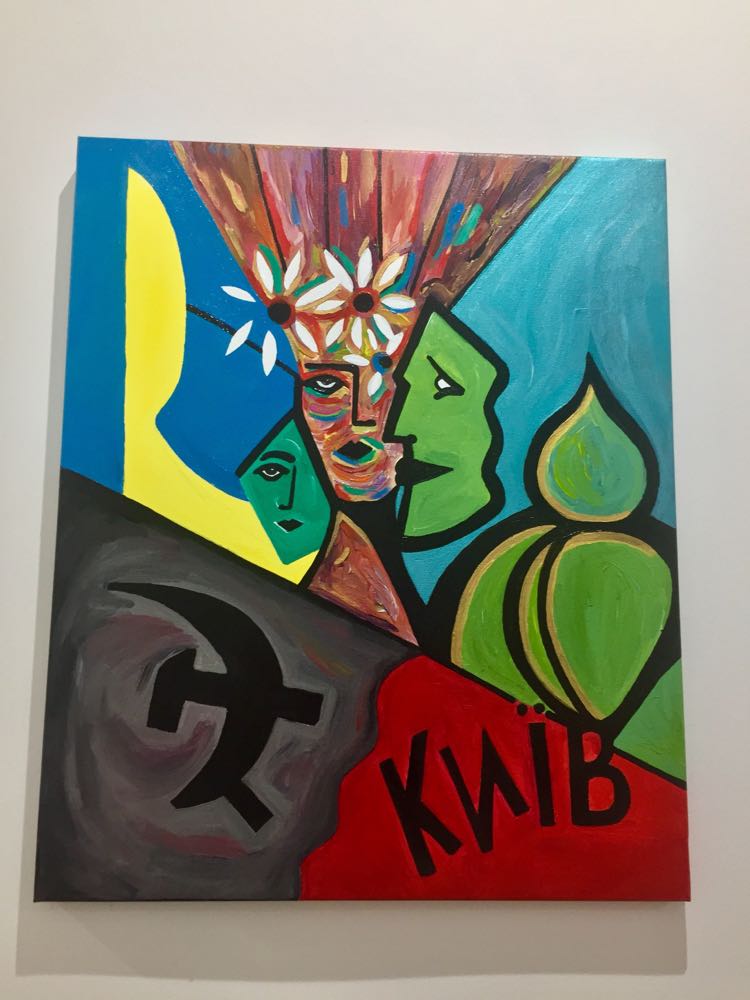
We turn to the purpose of my visit – the artworks they commissioned – and Viktoriya tells me that she put a message in a Facebook group looking for an interior designer and an art consultant.
“We had a bare apartment and Gul and Cisco came. We clicked instantly, and they gave us so much advice and help, and we also grew up in communist regimes, us in Ukraine and Cisco in Cuba so we had a bond, although Cisco is critical from a left-wing stance and we from a more American one, to do with liberty, but it sparked lively discussions.
“And then one day, we started talking about commissioning a series of works to recognise our journey, and there it started.”
HOME IS WHERE THE ART IS
With that, it is the perfect point to lead me into their long hall to show me Francisco’s amazing series of pieces. Francisco – Cisco – says, “At first, it was overwhelming, their story is epic, an odyssey embracing so many chapters. I thought, how do I convey their life and philosophical journey into something lasting and of value? I considered – and rejected – the idea of including Vienna and Rome, but the crucial challenge was to create something that would be meaningful to them as well as to anyone else viewing the work.
“It needed to convey transition and show the progression and journey. The project percolated and grew until I finally had a vision of how I would do it. I sketched out the first one, and I was a little nervous because it was the first time in my life that I had had four pieces commissioned at the same time. It took a lot of time thinking and sketching, and I tore up many attempts.
“The challenge was, to show the journey, to make sure that each piece works in its own right but also shows the progression. And, crucially, to avoid cliché – for instance, I didn’t want to show the Empire State Building or Statue of Liberty to represent New York or focus on the Golden Gate Bridge for San Francisco.
“So I was nervous about my ideas; they were very personal to me but obviously also very personal to the guys because it is their story.
“But when I brought my sketch to Paul and Viktoriya, they loved it, and that gave me renewed strength and vigour. And now I have finished, and I think we are all delighted with the outcome.”
Viktoriya laughs: “More than delighted! We thought, he will never accept the challenge, it is too much. But he did, and the outcome is magnificent, and we have something that will be an heirloom, that we can pass on to our family and it is both so personal and so beautiful.”
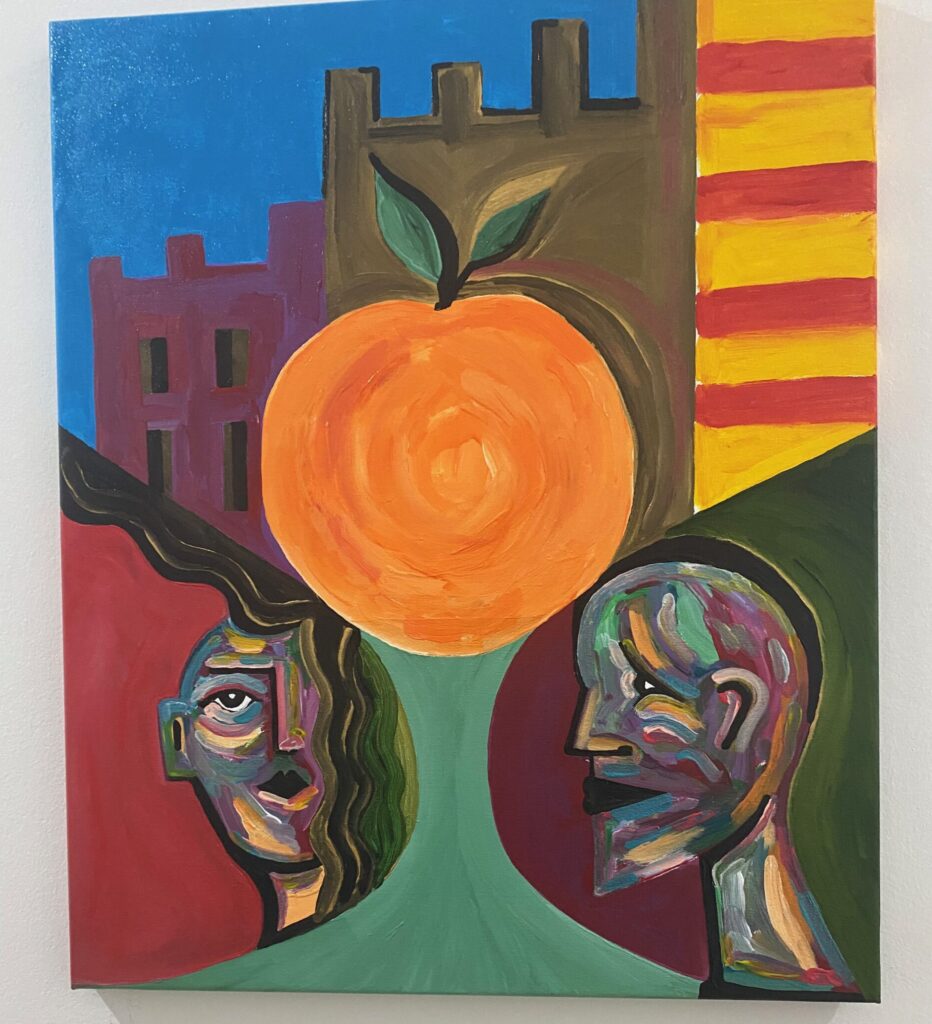
I ask Cisco to explain his style. He says: “I call it contemporary expressionism but in fact, it is a mixture of different styles. My art is figurative but I use the technique of abstract for the backgrounds. I mix my own oils and bright, vibrant colours that you might associate with abstract as my starting point, but then I move to figurative, and it was important to have all three in the foreground – this is their story, and that was my focus. It’s neither portrait nor landscape, but it is a layering process that starts with abstract, with figurative elements in the foreground.”
When I ask if his work could be considered Cubist, Cisco demurs slightly, then says: “Well, yes, Picasso is a huge influence, and I would never be offended to be mentioned in this context! But I am not scared of using circles or rectilinear elements, so I am not strictly Cubist, I guess.”
I say, the series for me represents the ability of the human spirit to overcome everything and is a celebration of that. Cisco replies: “It is a wonderful story, and it was a huge privilege to be entrusted with this commission. And now Paul and Viktoriya have become our very great friends.”
What Cisco has achieved is little short of extraordinary, and recounting this story is one of the great gifts of my job as a journalist and storyteller. Without putting a political gloss on this, in a period where feelings about immigration were invoked – in my view, disgracefully and irresponsibly – in the Brexit debate, to be trusted to tell such a wonderful story about emigration and how the world is constantly moved forward and enhanced by immigration and the assimilation of different cultures, was life-affirming and valuable.
• Francisco Bravo Cabrera lives in Ruzafa and is available for commissions; he has offered discounted rates for his work to readers of the Valencian. To learn about this offer and to arrange a chat, please email eugene@valencian.es
EUGENE COSTELLO
Story by freelance journalist and writer, Eugene Costello, formerly based in east London and now living in Valencia, Spain, founder of The Valencian https://eugenecostello.co.uk/
Explore the ranked best online casinos of 2025. Compare bonuses, game selections, and trustworthiness of top platforms for secure and rewarding gameplaycrypto casino.
224329 659679extremely excellent post, i certainly really like this exceptional website, continue it 641961